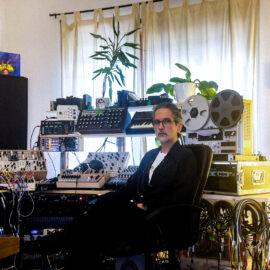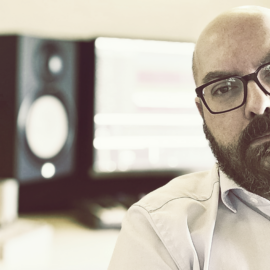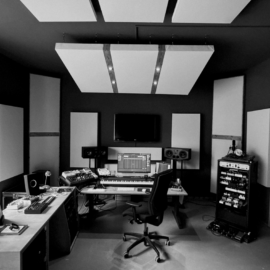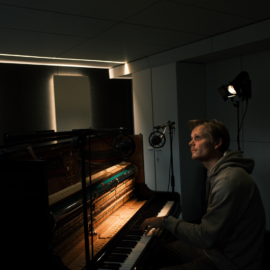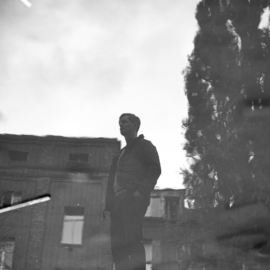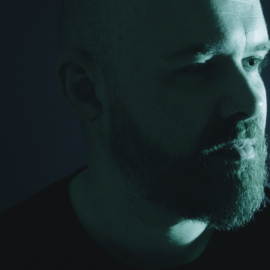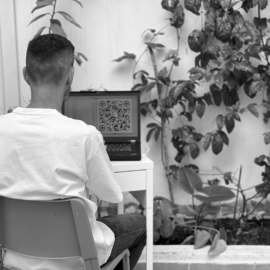The updated version of this guide is appearing nine years since its original publication. While you were going through its revision, how much have your views changed in nearly a decade, and were you surprised by this?
Firstly thanks for the suggestion to revisit this text, Mike. It had oddly been on my mind for a while now as in the past few years I’ve done quite a lot of mentoring with artists and musicians. So I had cause to pass on the first version of this text and have a lot of conversations around that.
Interestingly, I’m not sure so much has changed, as much as there’s been a greater reveal and clarity come through over the past decade. If anything I feel as though the aspirations held in the text have become more resolute. I feel even more strongly the questions we ask ourselves, the examination of ‘why’ it is we do what we do are ever so critical. In some ways, it’s never been easier to make, but it’s never been more fraught to find your voice, your way through the processes of making. I’ve always been a huge advocate for having a frame or being bound when creating work, I think that process can be hugely beneficial as it helps you think more deeply about how you approach what it is you do.
If there was to be one resolution that came to the fore it’s how critical respect is as a basis for how we operate in the world. Right now, there’s something of a dirty of that going on. I think we each can take a roll in reinforcing that fundamental way of being in the world with each other.
You talk about the difficulty of operating as a freelance artist in our sector of the economy. How has the impact of the lockdown during the pandemic personally and financially affected you as a freelancer and Room40 as an independent label?
Honestly? This has been a really difficult moment, but it’s nothing on what is coming. Right now we have some support from our governments, and the institutions that have survived are, to their credit, very open to supporting artists, but come the latter part of this year and into the first half of next year, I think this is when it’s going to become more intensely difficult for a lot of artists and those surround them.
During those months, I sense that we’ll see a collective backing off of governmental support, a kind of fiscal policy fatigue. We see it already, at least here in Australia and North America, the cuts are on the table and in some cases being actioned as I write this.
For my part, I decided back in March that Room40 would reach out to as many artists as it could and support them in whatever means it might. The result for that is pretty evident in the release schedule we have maintained. In our busiest years, we release maybe 25 or so editions. This year, so far we have released 43 editions. I’ve never been so busy with the label, it consumes a great deal of my life at the moment, but I feel very positive about how things have been this year. I’ve been able to pay a bunch of artists and right now that is a pressing thing!
I’ve also been working very closely with a number of artists helping them find opportunities to connect and get support for what they are doing and helping them, in some cases, get through the week to week. That has been gratifying to be a part of.
You provide us with your definition of success, but is there also a reward upon completion? Perhaps not in financial terms, but nevertheless a sense of accomplishment? Does success equal reward? If not, what is that for you, and how does it manifest itself in your projects?
Oh, I think there can be a huge satisfaction, or in some cases relief when you complete a project. When I talk about the idea of a deepening of practice, I think that might be something akin to what you’re talking about here. I guess what I don’t get satisfaction from is churning out something for the sake of it, or because it’s expected or repeating myself because it’s easy. Those things don’t equal reward or success for me, even if they might be perceived as one or either of those things by others.
A couple of years ago I created a work Seirá in Los Angeles ( there’s some documentation here). I found this project utterly rewarding and I’d like to think successful. It was quite possibly the most challenging project I have undertaken to date – logistically, conceptually and artistically. I worked with a team of people to realise something that seemed at times impossible to realise – folks like Robert Crouch who curated the piece and Jeff Kleeman who fabricated it and The Australia Voices who were the basis of the sound in the work. I felt completely exposed making it and whilst I’m not one to celebrate things in the moment, looking back on it I have a profound sense of satisfaction with that work. To me, it feels like what success perhaps should.
Do you think financial compensation, in order to support the artist, can be divorced from the definition of “success” in artistic output? In other words, why can’t the individuals, who stopped practising due to their economic instability, continue to produce more work for the sake of the arts?
I think in many cases artists can persist and they can make amazing work in the face of incredibly difficult and problematic scenarios. Some powerful work has been born in these moments. From my experiences though, I recognise that the absolute possibility of an artist is ultimately reduced by circumstances like this and in some cases destroyed by it. I think artists will make work as much as they can, they are driven to do it after all, but we need to consider how projects like neoliberalism, with its wholesale embracing of quantitative measurement, can be aligned with something like art, which is arguably more qualitative in its methodologies.
The massive precarity that dominates the arts reduces the capacity of artists to realise their work fully. When I speak to this, what I am interested in is a means through which artists can build their capacities and create works that reflect their capacities over time – a lifetime ideally. When I look back on all of the folks I started making work with, a great many of them have either stopped or really had to create work that is only a fraction of what they might choose to. That’s a missed opportunity in my book. I always think about that wonderful quote from Hokusai about the development and refinement of his craft.
When I was 50 I had published a universe of designs, but all I have done before the age of 70 is not worth bothering with. At 75, I’ll have learned something of the pattern of nature, of animals, of plants, of trees, birds, fish and insects. When I am 80, you will see real progress. At 90, I shall have cut my way deeply into the mystery of life itself. At 100 I shall be a marvellous artist. At 110, everything I create — a dot, a line — will jump to life as never before.
If you need another example, Éliane Radigue is a great one. She was in a position to dedicate herself to her work and the results have influenced a generation of composers, myself included. What typifies her as an example is the work she has done in the past 15 years. When it became clear she was no longer physically able to produce her electronic works, she applied herself, called on all that experience, and has manifest a collection of instrumental works that are truly special. Occam Océan, the large format orchestral work is such a profound work, it feels like the resolution of a life somehow.
Perhaps it is not so much about the relation of compensation and success, more about how sustainability can be realised and championed going forward and through doing allow for new relations to be interrogated.
You talk about learning and gaining insight from the elders and more experienced in the field. Do you think that most of their successes lie in the perseverance, clearly outlined definitions of goals, and setting and meeting those self-defined expectations, or is there an element of luck that goes along with surfing these volatile waters?
Cage was right, chance has a role to play.
In terms of how people make their way through the world, think it’s very much a case by case basis. For some it’s methodical, for others it is a reaching out into the chaos. I am sure perseverance is part of that equation also. That diversity of experience and approach though is the value of the exchanges you have with senior artists, curators and thinkers more generally. It’s often very incidental comments people make that hold weight in time. Small gestures or moments that when returned to weight more and more heavily. I value that greatly.
What are some of the more complex qualities of ‘hype’? Can one’s success be measured by getting signed onto a major label? Can one achieve their vision with the ‘spike of recognition’, even if it’s temporary, and then return to their roots while benefitting from the hype?
I am absolutely sure that a spike is all some folks want. Warhol has that covered for us well back in the 20th century. I don’t think there’s anything wrong with that either. Not everyone who cooks wants to be a chef. For some people, music, art, writing or acting, that’s a moment in their life and they move on to other things. There are no hard and fast rules for how anyone should make their way through their life.
I suppose I offer this guide more for folks who are trying to navigate their way through the long game. I think, like any relationship, those early years are thrilling, everything is new and exciting. There’s a woozy sense of discovery, that’s to be cherished. That’s also the time when it can be important to consider what that relationship might be going forward. Those deposits you put on, the methodologies you try (and in some cases throw away) all help you refine what it is you do going forward.
At its best, hype can play an important role in helping build an artist’s recognition. I know I owe a great deal to writers and critics who have taken the time to consider my work and to write about it. A very simple example I can offer is John Twells. I know, without question, John’s interest and subsequent support really helped me shortly after I wrote the first version of this guide. I am so very grateful to him for being interested.
In terms of the question about success, I think for many people the idea of ‘getting signed’ still holds a huge cache. They may class that as a success, but that’s really an outcome-oriented goal, for me those never really last in terms of what they contribute to you as an artist beyond their functionality.
You speak about finding your own unique language to convey your own ideas. But if that language becomes intricately complex, wouldn’t it fail to deliver the message if others are unable to parse it? Should one, perhaps, think about using a simpler language, understood by the masses, to convey not only their ideas but to capture and express the audience’s as well?
Werner Herzog.
I think when I say that name, each and every person will not only recognise it, they will have some affective response to that name. They will concur up surreal images, strange obsessions, intense visions of humanity and of course, that wonderfully intoxicating voice that has utter so much uneasy wisdom. This is not to say everyone loves the work that Werner makes, but it is to say many folks respect it, even if it’s not to their tastes all the time.
When I speak to the unique quality of our artistic voice, I’m not saying that has to be (or should be) somehow inaccessible, rather it should reflect our way of being in the world, our way of perception, our way of trying to understand. It’s not about being didactic, rather being invitational and offering a chance for people to open themselves up to experiences and perspectives they may not have encountered.
I think it’s a trap to imagine everything is for everyone. That likely means homogeneity and honestly homogeneity is a slow death. It’s ok if your work is not for everyone. I surely know mine is not for everyone out there, and that’s very much ok with me.
Time, most often than not, is exchanged in the form of compensation, converted to local currency on a rate based on supply and demand of those services or goods. Wouldn’t you agree? Is it possible to extract another sort of compensation for your time spent on a project (instead of just money), and in what form can that be? For example, “working” on Headphone Commute for over a decade presented me with enormous opportunities to meet in person and speak with giants such as yourself, Max Richter, Jóhann Jóhannsson, Clint Mansell, and Volker Bertelmann, just to name a few. It’s a “reward” I can’t convert to money. What other, non-financial rewards, can an artist gain?
Not sure I am a giant haha, but my hat helps add a couple of inches.
In seriousness, absolutely, I agree about the multiplicity of potential enrichments this life can bring us. I think you can definitely extract so many possible rewards, some of them are absolutely simple – like friendship. I have made some very deep, lasting friendships with artists who I consider my extended family. And those continue across your life if you are lucky, they are amongst the things I treasure most, to be honest.
The same goes for the opportunity to travel or to experience other artists’ work because you might share an event or exhibition with them. I think this also goes toward the comments I make about speaking to elders and having the opportunity to share what they have encountered over the years. I’m reminded of a Genesis P Orridge sculpture, a dedication to Brion Gysin who is quoted on it. It reads:
Wisdom can only be passed on by the touching of hands
I think there’s certainly something special about that one to one exchange. It’s been such a feature of our oral cultures and for me, as an Australian, the oral tradition of our indigenous people speaks to the power and lasting qualities of that way in time. They trace a history back on this continent for 65000 years, their cultures and way of being is based on this principle of human exchange, of community and the critical role our elders play.
All of those things you mention, the value add ons to the work we do are important to recognise, but there’s always precarity lurking, and it’s vital that it is as reduced as possible, for its toll on our collective mental health, if for no other reason.
I think one thing to keep in mind though is that compensation should not be one thing, in rejection of another. In an ideal world, for example, HC should be contributing to your financial stability as well as your interests as a writer and critic. The time you expend on it should have a financial and ‘other’ reward.
The service you do, the connections you facilitate for other listeners, artists and critics are immensely valuable. I think that can be said of many of the freelance writers persisting these days. I know personally I’ve drawn a lot from them, ideas that may be a reflection of their experience of an artwork, a film or a piece of music, I’ve found they open up much wider and more divergent questions.
Sometimes it feels like everything has been already done, in music and in arts. How does one explicitly seek out the road less travelled? Technology has enabled almost anyone to produce and distribute their idea far and wide, and as a result, one may feel like a tiny signal amidst all that noise. How does one stand out? Sometimes it feels like none of this is worth it, why should we put in much effort to go on?
There’s a lot of really vital questions raised here.
I think one very simple answer is to be curious and be open. The world has a way of revealing, and revealing again, and again to you, should you be available to it. It’s like any relationship, if you are invested in it, if you are giving it time and energy, that relationship grows and changes over time.
As to the question about feeling like a tiny signal, I think that’s perhaps not a bad way to conceptualise how all this can fit together. For a sound to be complex, for it to have a timbre that is rich and varied, it needs lots of frequencies. If all those frequencies are hugely loud, then over time it’ll likely not hold you. If however these tiny frequencies ebb and flow, their dynamics rise and fall, then very gradually you have a really beautiful sound happening. To frame this around ‘standing out’, perhaps that’s not the question we should be speaking to? Maybe it’s more to do with the richness of the experience we create, experience and share. Small is perfectly ok for some fo those experiences, big is good for others. Perhaps it’s about thinking how you want to operate over time in this sea of elegant noise?
I want to also just make mention, you speak about the role of technology, and I think this is an important thing always to consider in terms of how we do what we do and why. I think today, more than ever before, there’s so much possibility out there that’s made available through technology. You can essentially make anything, the challenge though is to make something. It’s easy to be seduced by technology to let it express a certain power over what you do, the challenge perhaps is to express agency over that technology, not have it expressly define you and your outputs.
You talk a lot about respect. I think that at the very centre of disrespect for what we do one can find the ever-growing ego that is fueled by some grandiose defilement of who one truly is. Have you ever had to put your own ego in check? Or do you find yourself on the other side of the spectrum – the constant doubt? How have you dealt with these particular issues and what advice would you give to someone who may be lost in their very own reality?
I think ego is certainly one source from which disrespect can stream. It’s maybe the most brutish expression of disrespect and always a TOTAL drag to be around. My comments though are aimed more at the insidious ways that disrespect can unfold.
In the ways that people are treated as different or worse as unequal. I think about so many of my female friends and family who have described the most depressing and maddening encounters with male counterparts. The same goes for many of my indigenous friends here in Australia. The structural power imbalances breed a very ugly place which spews forth disrespect framed by entitlement. It’s an entitlement that is embedded and embodied. This is the disrespect I want to be destroyed. It’s incessant and demeans us all. We are better than that, even if not everyone recognises it yet!
I’m sure there have been countless examples where inadvertently I haven’t been as respectful as I should have been. I have one very precise memory of being on a group project where we started a session with a conversation about identities and I got carried away on a point, and a collaborator shot me a look that was just what I needed to see. They gave me the look of ‘be quiet Lawrence, use your damn ears just now!’ They were spot on and I apologised and then just listened for the rest of that session.
None of us are perfect and we all make mistakes, speak when we should listen or act one way when another way is needed. That’s ok. Those mistakes help us grow, but what we need to be is reflexive enough to accept them and learn from them. Being generous to others and to ourselves is how great new developments in our world erupt.
As to the questions of doubt, you can bet I’ve felt imposer’s syndrome from time to time. I’ve noticed that’s especially the case when I am pushing out into something new and I feel very uncertain about myself. There are moments where you have to imagine what you are becoming and move towards that. It can be a challenging and uneasy moment, but if you’re honest with yourself I think you can benefit from those emergent moments.
On the topic of following through and honouring the agreements. How important is it to ask for a written contract? For someone who is just starting out in this field, it may almost feel “soulless” to turn an agreement into a “legal transaction”, but it may be necessary to avoid the pitfalls that you describe. What are your thoughts on getting it in writing?
This is a good question and there’s no universal answer for this. It very much down to the relations you have with those particular people and if you happen to be working with an institution then it’s another case altogether, as there are multiple parties involved and people come and go, which makes it more complex again.
For me, I have worked a great deal of my life with no contracts. This ties very closely to the writing around respecting the guide. I want to trust people, and I hope they trust me. That may read as naive, but I still try to honour that in my day to day.
I try to be a very clear communicator and make sure things are transparent from the beginning. If there’s a problem or question then I address that openly and try to be as available as I can be with that person. Ultimately if I am resorting to a contract to fix a problem, then whatever has led to that moment demonstrates a gross failing of the parties involved. I try never to let things get to that stage. Sometimes there’s no option and honestly, that really depresses me when it occurs. There are very few people I have worked with over my life who I have had a personal or professional falling out with. Relationships and what is shared between us all is so utterly valuable. It might take work and effort, but that connection, over time, is so vital.
With regards to building a community and thanking people… Do you see any potential issues of the implied “quid-pro-quo”? For example, let’s say a visual artist did an amazing job at providing a video that fully captures your musical idea, and they even did it for free. And you thank them for that. Now, a year later, they come back and ask for a favour that you’re more than happy to return. But the project that they’re proposing is not in line with your own aesthetics and you are hesitant on adding your name to the roster. In this situation, how true must one stay to their own defined language versus offering some help back to support the very same people that propped them up?
This is a real question I think many artists have faced. I think you have to take this on a case by case basis. There’s no hard and fast rule. There are people, who if they asked me to do just about anything, I would cut off a limb to achieve it for them. I love them, I love what they do, and even if it’s not exactly to my aesthetic in one instance, the value of their work in a meta sense holds so much for me that I’d want to assist them. Now that doesn’t mean I can churn something out for them that is ’not me’ but it does mean I can assist them as best I can to realise what their vision might be.
Often too, an invitation for one idea transforms in the process into something else. I’ve been asked by people over the years for a specific style of work, but if I sense it won’t work, I tell them that straight away. I make an offer to explore something with them and quite often it opens up their way of thinking about the work. Collaboration is wonderful in that way, it means multiple minds with very different approaches are set to the same task. Almost always there are curious results as a product of that investigation. I thoroughly love collaboration where I come in with one idea and leave with something I could not have imagined… it’s thrilling!
Read A Young Person’s Guide To Hustling (In Music and The Arts)
